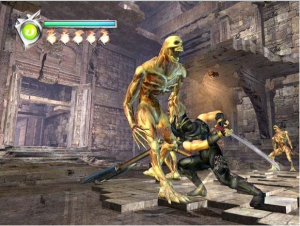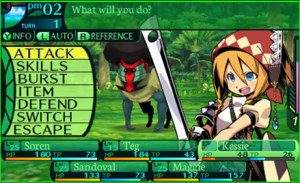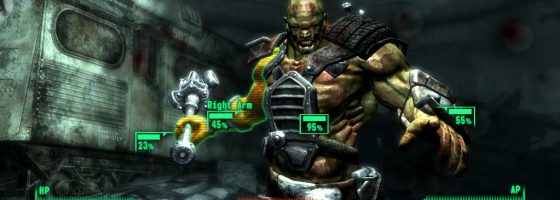Dark Souls 2 was a good game but suffered in my opinion from poor level, enemy and overall game design compared to the previous games in the series. Part of the problem came from relying on abstraction over player skill and is a major design trap we see RPG designers fall into when trying to mix action and RPG design to make a deep game.
+5 Player Skill:
Abstraction is a word I’ve used a lot when talking about game design and it has to do with the game systems and mechanics superseding or impacting player skill.
It doesn’t matter if I have cat like reflexes when it comes to dodging if my character has a slow reaction time stat, or my sword does less damage because the enemy is at a higher level than me.
Now abstraction is not by itself a problem with game design as genres like strategy and RPG rely on it to make sense out of their game systems. Many strategy games break down their more complex systems and rules using abstracted interfaces or mechanics to make something easier to understand.
Turned based RPGs are all about abstracted systems due to the nature of the genre. In fact the early days of the genre with Pen and Paper styled games are the very definition of abstracted design where dice rolls determine whether characters live or die.
The problem comes in when you try to combine action or player skill influenced systems with abstraction. First is the disconnect between what the player does and what is actually happening in game.
This is where Dark Souls 2 messes up with how much abstraction impacts the player. In my analysis of the game, I talked about how the designers introduced a new attribute called adaptation which impacts how quickly the character responds. More importantly, a high enough adaptation stat will let the player avoid damage while rolling via invincible frames.
In previous titles, timed rolls could avoid damage if the player was quick enough to respond. But in Dark Souls 2, that is now based on an abstracted factor. It doesn’t matter how reactive I am if the game decides whether or not I avoid a fatal blow or not.
Other examples would be from the recent Fallout and Elder Scrolls games which try to blend real time combat with abstracted systems and did not work in my opinion. The issue is that as the player, it’s not my skill or mastery of the game that is impacting whether or not I win, but what my levels are. I could shoot someone in the face with my gun and have it do barely any damage unless the game rolls for a critical hit.

Action games are less about character abstraction and more about the player’s skill determining their success.
The other and more pressing problem is that when you are basing your challenge level of the game on abstracted systems, it becomes much easier to break the game.
Going back to Dark Souls 2, after a horrible beginning where I was dying in almost every fight, I took the time to raise my agility to around 108.
Eventually reaching the point where I was almost untouchable during boss and enemy encounters and I was handling the bosses solo with ease.
The problem is that none of that improvement was on my end: I was still dodging the same way trying to time it just as well. The only difference between me failing at the start and being bored at the end was from an abstracted system.
Balancing Skill and Abstraction
If you’re trying to show that the player’s skill matters, abstracted systems will get in the way of that. If that’s all there is the challenge the player, then they will reach a point through mastery that they can figure out how to break the abstraction and render the game easy.
This is why games built around both player skill and character abstraction are the hardest to balance. You want to offer the player some sense of in game progression but at the same time you don’t want to hinder a player’s abilities. For example in The Witcher 2, action fans may have found it annoying that the mechanic of countering attacks was not fully tied to player skill, but had to be unlocked from the combat tree first.
Some ways that abstraction and action can work is if one helps the other without it getting in the way. In the Mario RPG series, the titles are all about turn based RPG combat. But players can help by correctly timing button presses to avoid damage or deal extra to enemies.
Demon’s Souls was a game that required a lot on the player to master it with the abstracted systems of RPG progression used more as an aid. Having a high level character with upgraded gear was not a substitute for being unable to dodge attacks.

While RPGS are less about the player’s hands on ability and more about understanding and making use of abstracted systems.
The Borderlands series is an interesting case, as they combined RPG progression and loot with player focused FPS combat.
It works largely due to the fact that the abstraction only comes in after the player’s skill is used to aim and attack an enemy. Critical hits weren’t randomly decided, but based on if the player hits the enemy in their weak spot.
Now if the game was using its own accuracy system to determine if the player would hit or miss with their guns that would be a different story. But by keeping both abstraction and player skill largely separate, it allowed both systems to work without getting in the way of each other. And all the weapons were based on abstracted RPG systems, but were still controlled and operated by the player’s skill.
Borderlands example was the opposite of design seen in Bethesda’s RPG’s like Fallout 3 and The Elder Scrolls series. Despite being played in real time (or pausable with VATS,) the player’s only real control was moving around and aiming their weapon. Once the player launches an attack, the game’s abstracted systems dictate whether or not the attack hits, if armor absorbs it and so on.
Generally speaking, the more control or player skill you are asking the player to master, the less abstraction you want to be factored into those systems. Adding RPG progression has become a popular way of adding depth to design. But it’s important to remember that it’s very hard to please both action and RPG fans as their preferences are almost polar opposites.
Someone who is playing an action game doesn’t want every move they make being dictated by behind the scenes systems just as much as someone playing a RPG is not looking for twitch gameplay. Very few games have managed to create something that both groups enjoy and most people prefer to play a game that is focused on one area of design, with lesser systems built around the other. Such as action titles that feature skill trees for upgrading characters or unlocking new abilities.
While this approach prevents you from having your cake and eating it too in a manner of speaking, you can at least be sure that one group will fully enjoy your game. And lastly, for more on this topic you can read my original article on abstracted systems featured on Gamastura.


